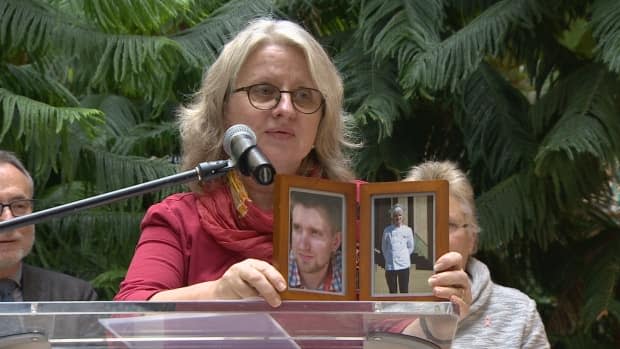Opioid drug deaths killed 997 Albertans in the first 11 months of 2020

(CBC - image credit)
A new surveillance report from the Alberta government indicates that 997 people died of opioid overdoses from January to November 2020.
The latest numbers give a glimpse at November, where a total of 113 people died, 106 of them from opioids. In the newest November opioid numbers, Edmonton and Calgary continue to be the hardest-hit communities.
For Petra Schulz, co-founder of Moms Stop The Harm, the first issue is the supply. She said a pharmaceutical-grade supply of drugs available by prescription has to be the first step.
"[People] are dying because the only substances they have access to are highly unpredictable, highly toxic and that's why we see these high death rates," she said.
"The only logical answer to this, is to provide people with a safe, regulated supply of substances."
Schulz lost her son Danny in 2014 to an accidental fentanyl overdose. The day before he died, he asked her to make an appointment with his doctor and psychologist. He never made it to those appointments.
"I'm all for investment in treatment … but if people don't live long enough, they will never make it to treatment," she said.
Sometimes, people who overdose don't have a substance abuse disorder, she said. People do use drugs casually and treatment isn't the answer for everyone, she said.
In a statement, Kassandra Kitz, press secretary for the associate minister of mental health and addiction said, Alberta has been working to establish "a full continuum of care for people struggling with addiction, inclusive of prevention, intervention, treatment and recovery.
"We have no intention of flooding the streets with cheap, taxpayer-funded opioids, as British Columbia is doing, as we believe this is how the crisis started in the first place and such endeavours are not grounded in evidence," Kitz said, adding that Alberta's opioid depency programs supply "evidence-based" medications like Suboxone and Methodone.
Opioid death numbers have remained fairly consistent since August.
Jennifer Jackson, a registered nurse and an assistant professor in the faculty of nursing at the University of Calgary, said it's extremely disappointing the province is still in the throes of an opioid crisis.
"I cannot say that I'm surprised," she said. "Unfortunately, we have not seen a policy response that matches the significance of the problem."
Jackson said there have been plenty of opportunities to intervene but they haven't been taken.
"It's very sad for me to say this, but I don't see this problem changing any time soon until we have robust policy responses that are based on science, not on stigma," she said.
Jackson likened the policy response to date to pouring gas on a fire, and said the province is running fast in the wrong direction.
Both Schulz and Jackson pointed to the closure of the Lethbridge supervised consumption site as one concrete failure.

Schulz said she is glad the government is at least investing some money into the issues and she's glad they're doing these reports.
"But the numbers are only useful if they guide policy, if they guide health policy. If the numbers just tell us how tragic it is, we can't allow for that to happen," she said.
The current government is more driven by ideology rather than evidence when it comes to their health policy around substance use, she said.
"Much of these treatment spaces that are being funded, they are abstinence-based treatment which is not the recommended approach for opioid use disorder, yet we know most people are dying of opioids," she said.

